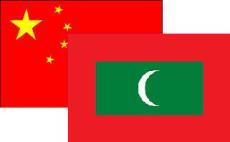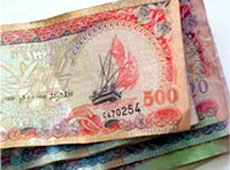The past week has seen the administration of President Adbulla Yameen make tentative steps towards resolution of the country’s dire economic situation.
The Government of China offered the Maldives US$8.2million in grant aid for development projects. Reports also emerged in Indian media of its government being on the verge of unfreezing a credit standby facility – initiated before the recent deterioration in bilateral ties.
The New Indian Express suggested that the official announcement would be made during Yameen’s visit to India, also announced in the past seven days.
Further aid flows for climate change adaptation projects were also forthcoming, with the European Union pledging an additional €4million to the €34million given since 2009.
Solid progress on the 2014 budget continued to elude the government this week, however, with the submission of details to parliament delayed for the fourth time as the finance minister awaited further specifics about the administration’s plans.
Specific designs for the long-awaited construction of a bridge linking Malé and Hulhumalé were requested by the government, although foreign investor confidence is unlikely to have been improved by the Maldives’ failure to appear on Transparency International’s Corruption Perceptions Index for the second consecutive year.
Meanwhile, confidence in the country’s tourism industry remained undiminished at the World Travel Awards in Qatar, where the Maldives collected the prize for ‘World’s Leading Island Destination’.
Politics, police, and protecting Islam
Despite prior promises of leniency from the government, Maldivian Democratic Party MP Hamid Abdul Ghafoor was briefly imprisoned this week after the Supreme Court revoked a number of parliamentary privileges.
Hamid – who has cited parliamentary privileges to defend himself against contempt of court charges – spent just hours in Maafushi jail before the High Court overturned the Criminal Court’s six-month sentence.
Fellow MDP MP Imthiyaz Fahmy led the Parliamentary Privileges Committee in suggesting that the Supreme Court was compromising the independence of parliament.
Elsewhere in the Majlis, MPs from all sides of the political divide took to the floor of the house to support a constitutional amendment further safeguarding Islam’s position as the country’s sole religion.
The police this week recommended that the Prosecutor General’s office pursue charges against Raajje TV’s CEO and its head of news for a report criticising the Supreme Court. Police also detained an individual in relation to the arson attack that destroyed MDP-aligned Raajje TV in October.
Less progress was reported in the case of Supreme Court Judge Ali Hameed’s sex-tape allegations, with police admitting they have been unable to identify the individual widely reputed to be Hameed. The police did, however, promise that more information from abroad may yet shed light upon the issue. Local media had suggested that police investigations had been thwarted by the Criminal Court’s failure to provide the required warrants.
Retired Police Commissioner Abdulla Riyaz was honoured this week by his former colleagues prior to his move into the political arena. Home Minister Umar Naseer used the celebrations to order police to remove any material that might incite hatred against the force.
The fostering of dissent within its own ranks was the reason given for further dismissals within the military – three senior officers were dismissed, whilst 34-year veteran Lieutenant Colonel Zubair Ahmed told Raajje TV that he had been forced to retire from the MNDF.
The Defence Ministry this week threatened action against any media outlets who criticised its disciplinary procedure, subsequently receiving censure itself from the Media Council.
Finally, preparations for the January 18 local council elections continued in the past seven days, with government-aligned parties – excluding the Adhaalath Party – deciding to divide seats up amongst themselves to maximise their prospects. The opposition Dhivehi Rayyithunge Party hopes to arrest its declining fortunes going into future polls by rebranding its party color, logo and slogan.
 In September 2012, President Waheed told
In September 2012, President Waheed told  electricity and phone bills if funds were not transferred from the MVR 1.8 billion (US$117 million) Public Sector Investment Programme (PSIP).
electricity and phone bills if funds were not transferred from the MVR 1.8 billion (US$117 million) Public Sector Investment Programme (PSIP).